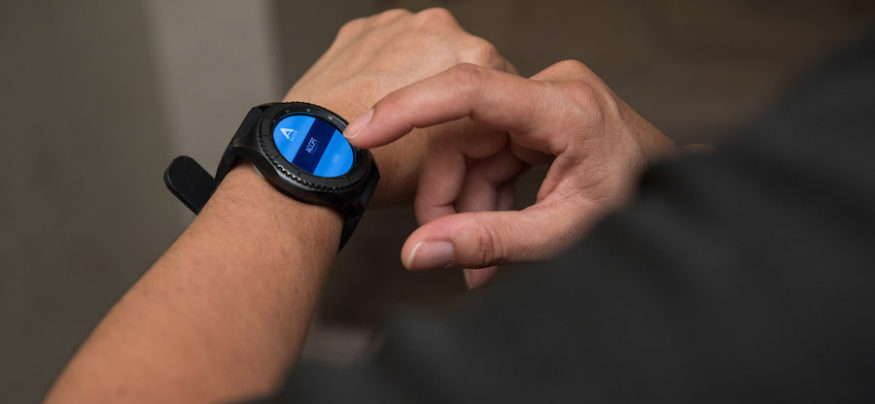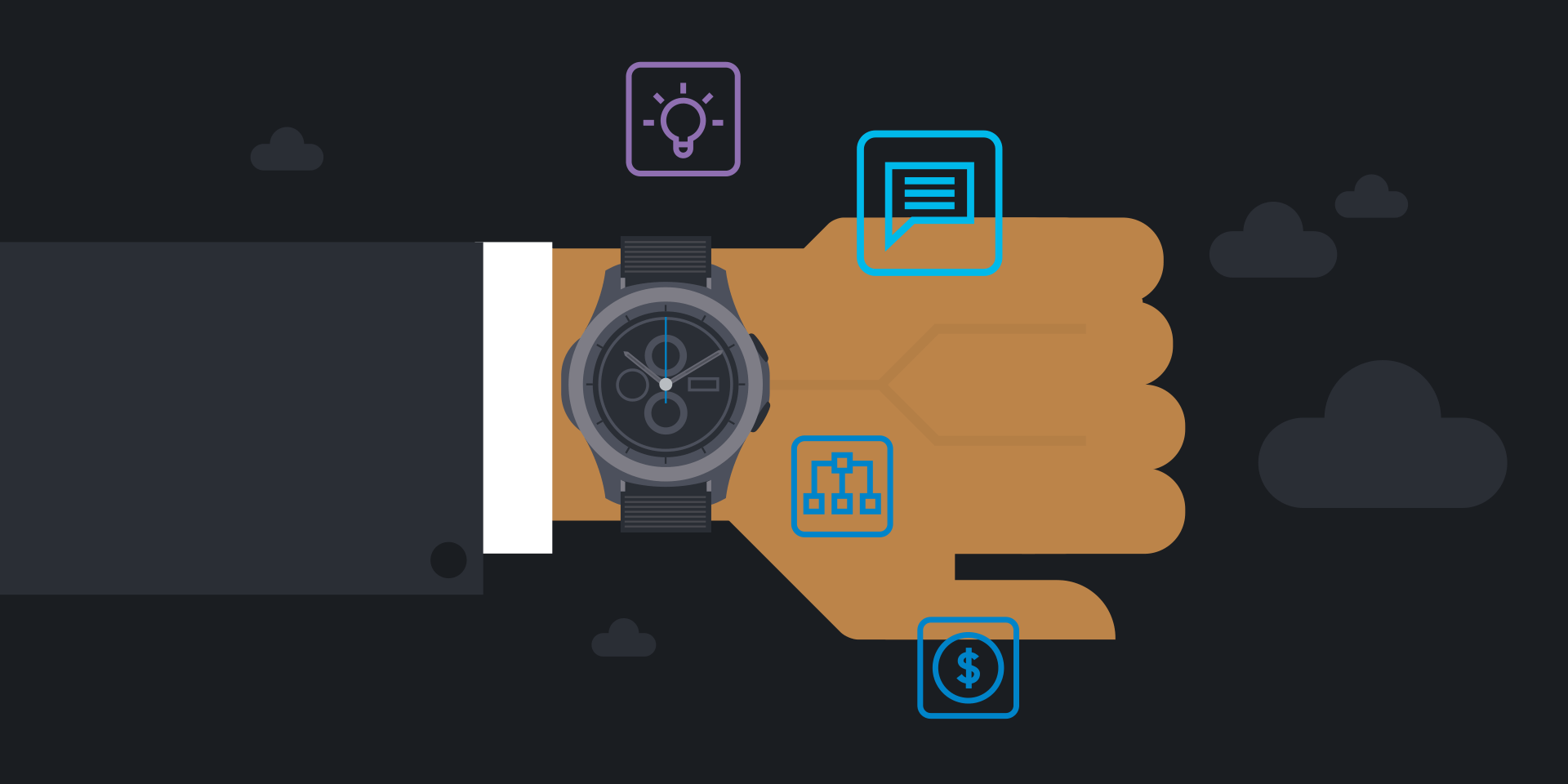Hotel staff responding promptly to guests’ every need? Perfection. Guests constantly seeing staff members with heads down, staring at phones? Not so much.
Behind the effortless hospitality that guests see, hotels are beehives of staff activity that must be carefully orchestrated to ensure a pleasant, successful stay. That has prompted a growing number of properties to adopt task management and collaboration platforms. But the need to use handheld devices to send and receive tasks, alerts and other messages as part of these solutions is producing an unintended consequence: hotel employees often have to look down at their phones to use them. To guests, that can read more as distraction than attentiveness. That’s one reason savvy hoteliers are beginning to adopt employee wearables.
Wearables such as Samsung’s Gear S3 are proving an ideal tool to speed and streamline hotel operations and boost guest satisfaction. They provide an instant, hands-free view of tasks, which can reduce response times significantly and enhance service. IDC predicts commercial watch deployments will grow from just 3.3 million units in 2017 to reach over 11.5 million units by 2021, a compound annual growth rate of 34 percent.
At the Beverly Hills test property of Viceroy Hotels, for example, staff with wearables running the ALICE task management platform respond one to three minutes faster to guest requests than at properties where they only use handhelds. Cutting that response time “definitely improves the feedback you’ll get from the guest,” says Darren Clark, vice president of technology at Viceroy Hotels and Resorts. “This is going to affect the department’s speed, efficiency and operation. It helps the hotel employees and it helps the guest as well.”
Staff Wearables at Work
Wearables offer benefits over smartphones in every department. In fact, they also help break down departmental silos, by enabling easy, quiet, hands-free communication and collaboration across any hotel-defined group. That’s ideal for requests and tasks that cross department boundaries.
Key hotel operations use cases for employee wearables include:
- Bellman/Valet: Staff members can receive messages and accept tasks even while carrying bags or heading out to retrieve a car. Wearables enable a quick, hands-free glance at the next task, and optional LTE capability reaches garages and other areas without Wi-Fi coverage.
- Housekeeping: The task management system automatically locates the closest staff member for a towel or bottled water request and sends a silent, vibrating alert to the watch, so guests aren’t disturbed by a ringtone or squawky radio. Via push-to-talk, staff members can instantly communicate with the team to coordinate cleaning or request supplies.
- Front desk: Front desk staffers can discreetly send or respond to a request while only momentarily breaking eye contact with the guest.
- Maintenance: Instead of tracking down the best available repair technician by radio and then calling the guest with an expected wait time, the system can quickly locate the tech, send a silent, instantaneous response, and get back to the guest much faster.
- Security: Hotel security staff can communicate instantly and discreetly, avoiding noisy disruptions that disturb and unnecessarily alarm guests.
How Employee Wearables Improve Hotel Operations
Wearables take task management and communication to the next level by putting messages in direct eyesight of hotel operations staff. Faster communication paired with capabilities like push-to-talk improve productivity in just about every hotel department. Other benefits include:
- Faster response times: Messages and tasks reach the staff member much faster, because they don’t have to wait for a sound or vibration, fish the phone out from a pocket, activate the screen and then read and respond to a message. A silent vibration alerts them to a message, which they can read hands-free and instantly acknowledge with a brief touch to the wearable device.
- Translation: Each smartwatch can be configured for the particular tasks, communication groups and preferred language of the wearer, enabling clear communications across multilingual staff.
- Ensuring high service levels: If a staff member does not touch their smartwatch to acknowledge an assignment in a certain amount of time, the software’s logic engine automatically escalates it to other staff members and/or a supervisor, to ensure guests are served quickly and no request goes unfulfilled.
Customizing Wearables in the Workplace
Learn how to develop new and innovative wearable apps tailored precisely to your business needs. Download Now
- Streamlined communications: With radios, staff members often share channels and conversations can drag on, so others have to wait to communicate. Wearables’ streamlined profiles promote concise, efficient communications, with no waiting. Hotels can designate specific communications groups for each type of alert and message.
- Measurement: Staff members touch the smartwatch to acknowledge a task, then again when they receive it. That enables managers to audit response times to ensure the right number and location of staff to respond quickly to guest requests.
- Less damage: Because their waterproof and strapped on the wrist, smartwatches like the Gear S3 get less wear and tear, keeping repair and replacement costs low.
- Higher employee satisfaction: Staff members appreciate being empowered with cutting-edge technology that simplifies tedious tasks and helps them focus on the best parts of their jobs.
At Houston’s Hotel Alessandra, using Samsung Gear S3 with Hipaax TaskWatch software means staff respond to guests more quickly, every message sees follow-through and the property maintains its quiet ambiance, while avoiding excess staffing and shielding guests from the hubbub of running a hotel.
Making Wearables Work
Samsung’s wearables products and services make smartwatches easy for hoteliers to use and own. Integration with the ALICE product suite means hoteliers can order Gear S3 smartwatches with the software already preloaded, or Samsung can help integrate wearables with other applications. Samsung’s EMM for Wearables helps manage the fleet by automatically pushing out updates and locking down the software, among other features all without the need to pair the smartwatch with a mobile phone.
Keeping hotel operations humming and guests satisfied demands carefully orchestrated communication and coordination. Hotel wearables help boost guest experience and satisfaction by enabling staff to view tasks at a glance and keep staff focused on engaging with guests.
Learn how you can impress your guests and streamline operations by checking out our latest hospitality technology solutions.


